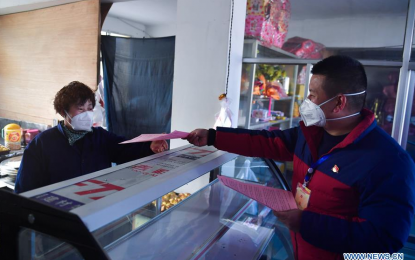News
Xi orders military to help win fight vs. nCoV

FILE: FIGHT VS. nCoV: A staff member hands out leaflets on prevention and control of the novel coronavirus to a local villager in Datong Hui and Tu Autonomous County, Xining, northwest China’s Qinghai Province, Jan. 29, 2020. Various measures are taken across China to combat the novel coronavirus. (Photo: Xinhua/Zhang Long via PNA)
BEIJING — President Xi Jinping has ordered Chinese military to keep its mission firmly in mind and shoulder responsibility to make contributions to winning the battle against the novel coronavirus epidemic.
Xi, also general secretary of the Communist Party of China (CPC) Central Committee and chairman of the Central Military Commission, made the remarks in a recent instruction to the military on the prevention and control of the outbreak of pneumonia caused by the novel coronavirus.
The military resolutely implemented the decisions and arrangements of the CPC Central Committee after the novel coronavirus outbreak in Wuhan of Hubei Province, Xi said, adding that the armed forces rapidly initiated the joint prevention and control mechanism and sent elite medical teams to combat the epidemic at the frontline.
Xi said the epidemic prevention and control remained grim and complex and demanded the armed forces shoulder their responsibility, fight the hard battle and actively assist local authorities in fighting the epidemic.
The armed forces are tasked with treating patients in Huoshenshan Hospital in Wuhan, which reflects the high level of trust that the Party and the people place in them, Xi said.
To meet the expectations and fulfill the task, the military must strengthen leadership, enhance coordination with local authorities, adhere to scientific treatment, and pay attention to their own protection, Xi added.
Huoshenshan Hospital, which is under construction, is a makeshift hospital dedicated to treating patients infected with the novel coronavirus.
Xi ordered military hospitals engaged in the epidemic control to treat patients with all-out efforts and military research institutions to step up scientific research to contribute to winning the battle against the epidemic.
Supply of daily necessities stable
Supply of daily necessities remains steady in major Chinese cities while authorities are stepping up efforts to ensure continuous supply and stable prices amid the novel coronavirus outbreak.
Inventory of daily necessities including meat, rice and cooking oil is generally sufficient in major cities across the country, according to the Ministry of Commerce (MOC).
MOC data showed that current reserves in Wuhan, the central Chinese city at the epicenter of the outbreak, can secure supply of rice and cooking oil for over 15 days, pork and eggs for over 10 days, and vegetables for about five days.
Supply of vegetables in 46 wholesale markets and supermarket franchises in Beijing ticked up about 10 percent during the Spring Festival holiday, while the eastern city of Nanjing kept a local government reserve of staple vegetables that can last seven to 10 days.
On the production front, output of winter and spring vegetables grew 2.7 percent year on year to 770,000 tons, according to data from 1,000 vegetable information sites monitored by the Ministry of Agriculture and Rural Affairs (MARA).
In response to the groceries shopping spree in some cities, MOC official Wang Bin said the government and the private sector are making all-out efforts to expand market supply of daily necessities and advised against panic shopping.
Wang said the government is taking measures to tackle logistic barriers and labor crunch caused by the outbreak. MARA analyst Zhang Jing stressed smoothing transportation as the next priority.
The government has pledged efforts to sustain continuous supply of necessities to coronavirus-stricken areas, with the National Development and Reform Commission arranging daily transport of vegetables, cooking oil, rice, and flour to Wuhan.
Other measures include expanding production of winter and spring vegetables, as well as coordinating wholesale markets across the country to replenish supply of vegetables, meat and eggs in infection affected areas.
Supermarkets and online retailers including Walmart, Yonghui Superstores and Freshhema have vowed to ensure supply without raising prices during the holidays and despite the virus outbreak, said Wang. (Xinhua)





















